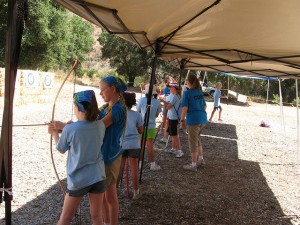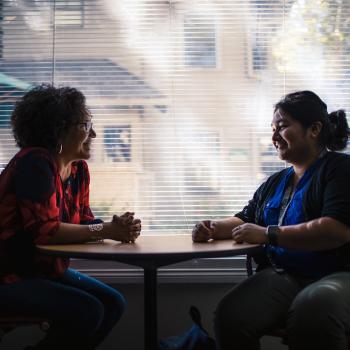By Rachel Paprocki
I grew up spending a week every summer at a Christian camp in the San Gorgonio Wilderness, 5,800 feet higher than San Bernardino. High above the layer of smog that hovers over the 10 Freeway, there’s clear air, sweet with Jeffrey Pine and oak trees, the gravelly forest floor carpeted with their fallen leaves. At the end of Radford Road, off the 38, there’s a somewhat-dilapidated campground that is home to some of my favorite memories.
For whatever reason, I always attended all-girls weeks there. No little brothers, no dads, no oratory Sunday preachermen—just a bunch of ladies in the forest with guitars, bows and arrows, and canoes. It was perfect play.
Being raised by a single mother, I was used to female leadership, naturally comfortable and certain that women are adept at pretty much everything. Nothing about girls’ week at camp needed explaining for me, because I was not all that surprised by the concept of a woman making dinner, paying for dinner, and praying over dinner with skill and authority.
One summer, my mother opted to register my siblings and me for a co-ed week of camp, probably to get all three of us out of the house at once. I didn’t mind much. Those co-ed weeks were run like two concurrent, gender-exclusive camps that shared leaders only by necessity. There was, for example, only one Pepper, maven of the archery course and next-level songfest leader. Only Mocki knew how to make a 16-strand lanyard, and no one could give a campfire talk like Swifty. No camp experience would be complete without these women, or some version of them. All these women continued using their gifts in full force during the co-ed week, but I can’t help but feel a bit of pity for the campers who saw them only in these roles, or the all-boys week campers who never saw them at all. They missed out on seeing the whole Pepper, the whole Swifty. I can’t imagine my life without having known more about these incredibly dynamic women than only their best skills.
There are at least two takeaways here (other than, of course, the absolute necessity that children spend significant time out of doors and out of the city if they ever want to turn into cool adults who can build one-match campfires and name all the constellations in the summer sky).
First, the experience of seeing someone who ‘looks’ like you doing something important, and doing it well in front of other people who don’t look like you, is invaluable in allowing humans of all genders and ages to explore the realm of possibility. Telling children that they are capable of adventure isn’t enough; they must also be shown. By the same token, it won’t work just to tell grown women that they are vital in the workplace, the home, the church; we must also be shown. This is not a new concept, but it will be enacted all the more powerfully if we are shown that we’re able and necessary by dynamic leaders who are known for more than only what they’re best at, who are known for being real people that just happen to be present in leadership roles. Capable women must be invited to lead, and our dynamic presence must be felt all the time, not just at show time.
Secondly, it might be easy to do and seem quite practical for short-term goals, but in the long run it’s unhelpful and dangerous to consider leaders based only on their strongest, most-visible skills. We functionally deify pastors, professors, and presidents when we assume that their capability in leadership applies equally to all the other parts of their life. The problem with this is clear, but a less-obvious ramification for the layperson, who naturally seeks to emulate the leader, is that they (we) forget that weaknesses are natural when we only see power at play. None of us is wholly capable of everything all the time, and just as little girls must see other girls (maybe grownup girls) leading, all humans must be exposed to the reality that even gifted leaders are fully human—fully weird, fully fallible.

I wonder what the boys at camp that week thought of the women they saw, given that they only appeared when their skills were needed: that older women who happen to be in the forest are all archers, artists, and preachers? Perhaps this camp example is not the best one, because I think we’d all be happy in a world where forests and cities alike were occupied by these kinds of women. The point is rather that gender issues only disappeared when their presence was needed to accomplish some task. Otherwise, we stayed on our respective sides of the campground.
I was lucky to have this issue of female leadership presented to me in a safe, invigorating environment like summer camp, where later on I myself learned to lead. But many humans are growing up (and I myself continue to grow up) in a world where women appear to lead mainly with one dimension of themselves, whether with their bodies, tastes, skills, or words—but rarely with more than one, let alone a healthy combination of these.
Bringing women into leadership means more than allowing, admitting, passively listening, enjoying only the best parts of us. Just doing those things is not enough, whether for the church, the home, the marketplace; those actions alone amount to another form of commodification of women. If we believe that we are creations of the Divine, in order to truly embrace that identity, all humans must be continuously, holistically integrated into the lives of those around them, regardless of our gender, and our place on the totem pole.
I’m not suggesting that we do away with girls- or boys- only weeks at summer camps—I look back at those camp summers with too much fondness for that. Almost anything that’s cool about me is a result of those ladies running around the forest and inviting me to join them. But they saw me for all of me, and I saw all of their own weirdness, and that’s where we were able to lead each other. I’m sure there’s a wilderness survival skill in there somewhere—now just to apply it here at the foot of the mountain.
Rachel Paprocki survived being raised in Murrieta, CA by knitting and reading voraciously. An alumna of Pepperdine University (BA, 2010) and Fuller Theological Seminary (MA, 2014), she has earned her keep with a year-long stint teaching English in northeastern China and then by making coffee in the greater Los Angeles area, which she traverses by bicycle. She is the managing editor of the the Fuller Writing Center.
You can follow Fuller Seminary on Twitter at @fullerseminary.












